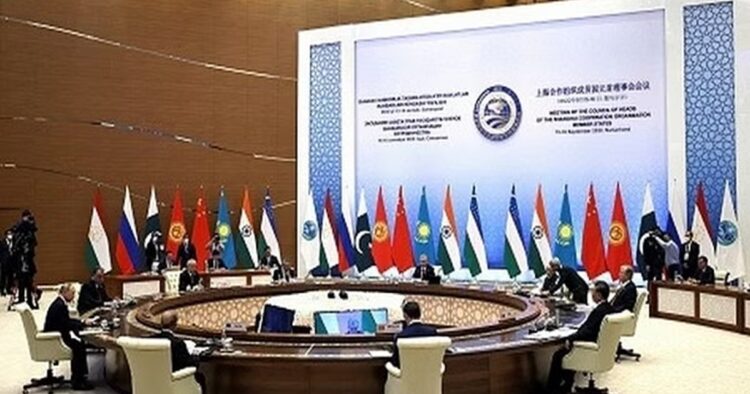In 2023, India took a significant step on the global stage by leading two major international groups: the Shanghai Cooperation Organization (SCO) and the G20. On July 4, 2023, India hosted the 22nd Summit of the SCO Council of Heads of State. This event, chaired by Prime Minister Narendra Modi, was held virtually and marked the first time India led the SCO.
India’s leadership of the SCO came during a period of global upheaval. The world was dealing with the COVID-19 pandemic, the Taliban’s takeover of Afghanistan, and the ongoing Russia-Ukraine war. These events have disrupted established international norms, providing India with a unique chance to guide discussions on critical issues affecting Eurasia and beyond.
Strengthening Ties with Central Asia
One of India’s main goals during its chairmanship was to strengthen relations with the five Central Asian countries. Central Asia is a region of great strategic importance and part of India’s “extended neighborhood.” By leading the SCO, India aimed to promote cooperation with these countries, enhance connectivity, boost trade relations, and ensure regional security.
India became a full member of the SCO in 2017, alongside Pakistan, during the annual SCO Heads of State summit in Astana, Kazakhstan. Before that, India had Observer Status at the SCO since 2005. India began the process of gaining full membership in 2015 at the Ufa Summit in Russia. This move was part of India’s broader efforts to engage globally, which gained momentum after Prime Minister Modi took office in 2014.
Several factors motivated India to join the SCO. These included improving connectivity between Central and South Asia, promoting energy security, and combating terrorism and the illegal drug trade. The SCO has played a crucial role in maintaining political stability in Central Asia, aligning the interests of major powers in the region, and curbing terrorism, separatism, and radicalism.
Changes in the SCO Dynamics
India’s entry into the SCO has significantly changed the organization’s dynamics. The SCO can no longer be seen as a coalition of authoritarian states with an anti-Western agenda. Russia and the Central Asian states supported India’s inclusion, viewing it as a stabilizing force and a potential regional investor.
However, the ongoing border conflicts between India and China, as well as India and Pakistan, pose challenges for the organization. As India becomes more involved in the region, Beijing and Moscow will need to allow New Delhi more influence within the SCO.
India’s participation in the SCO aligns with its broader strategy of multi-alignment, complementing its involvement in other groups like BRICS. India’s geopolitical interests in Eurasia are driven by security and commercial considerations, as stability in Central Asia is vital for India’s security.
Without SCO membership, India’s efforts to engage with Central Asia would be hampered, potentially allowing China and Pakistan to dominate the region.
Fostering Connectivity and Security
India’s membership in the SCO supports Russia and the Central Asian states in balancing China’s influence in the region. Central Asian states are keen to strengthen economic ties with India, making it crucial for New Delhi to prioritize involvement in developmental, connectivity, and infrastructural projects in the region.
In recent years, India’s highest political offices have actively promoted connectivity projects, coinciding with India’s membership in the SCO. This initiative aligns with Central Asian states’ desire to enhance connections between Central Asia and South Asia.
ALSO READ: ‘China Deploys Aircraft Carrier Shandong Near Philippines Amid South China Sea Tensions”
For example, during the 2022 Samarkand Summit in Uzbekistan, Prime Minister Modi held discussions with Russia, Iran, and Uzbekistan to accelerate connectivity projects along the North-South axis. These projects include the International North-South Transport Corridor (INSTC) and the Chabahar Project, with efforts to integrate Chabahar into the INSTC framework.
Addressing Regional Security Issues
India has also used the SCO platform to engage with Central Asian states on regional security issues, particularly concerning terrorism from Afghanistan. Uzbekistan, Tajikistan, and Turkmenistan, which share borders with Afghanistan, are crucial stakeholders in the region’s stability. The SCO needs to implement measures to counter the threats of ISIS emerging from Afghanistan.
India’s proactive involvement in the SCO demonstrates its commitment to fostering regional stability, enhancing connectivity, and promoting economic cooperation in Eurasia. As India’s role within the SCO evolves, its influence in Central Asia is expected to grow, aligning with its broader strategic objectives in the region.

















Comments